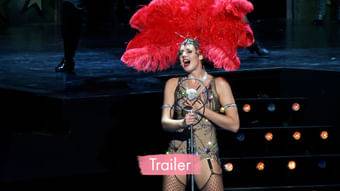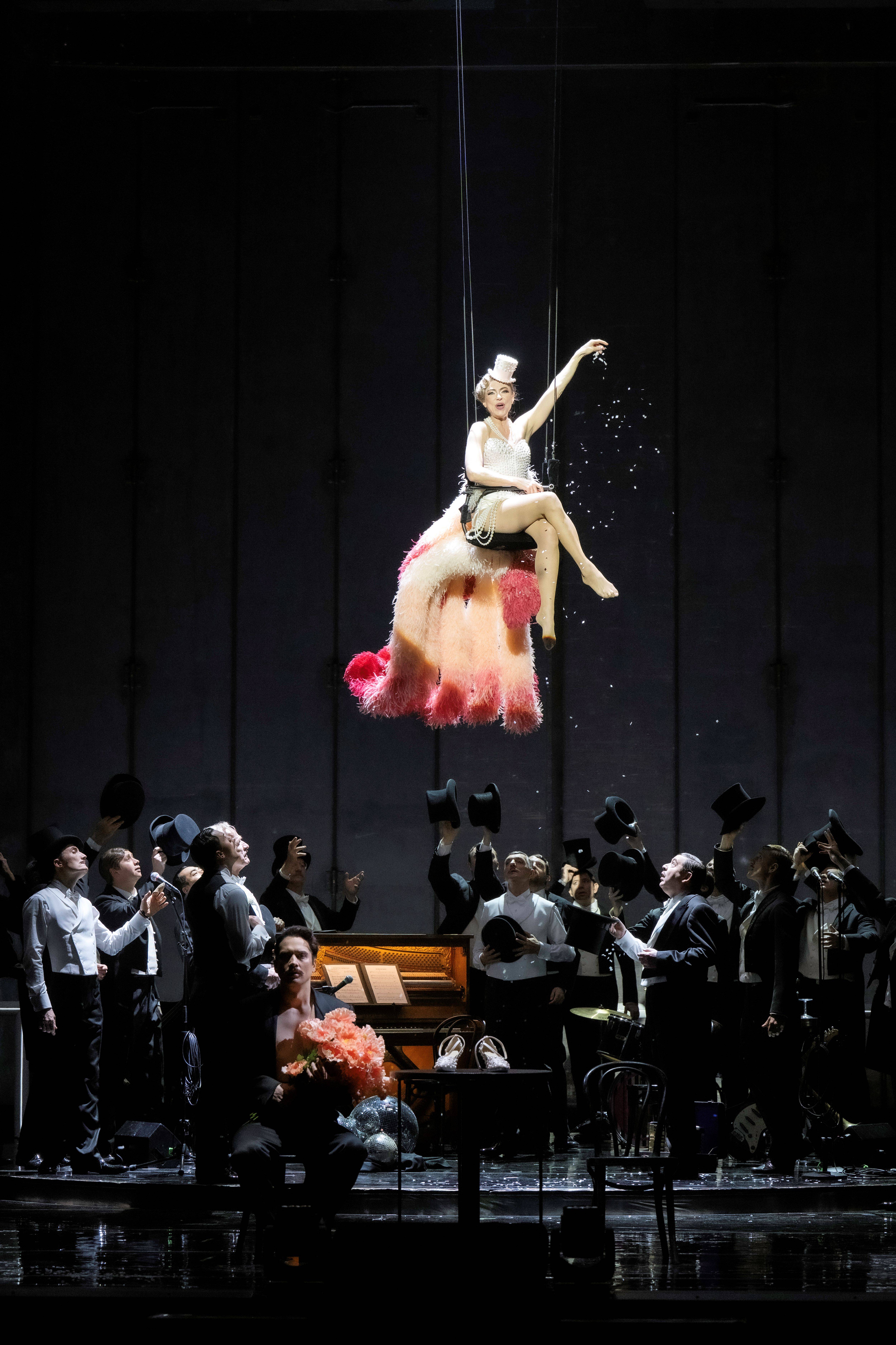Clifford Bradshaw, a young American writer, has come to Berlin to get inspiration for his new novel. In the legendary Kit Kat Club he meets the most exciting creature of Berlin nightlife: the singer Sally Bowles. They fall in love, but both have too little to live for ... Fräulein Schneider and the Jewish fruit merchant Herr Schultz also try to protect their love from the looming Nazi regime. Faced with an uncertain future, all those involved have no choice but to live in the moment: "So come to the Cabaret!”
Act 1, Berlin, 1929: “Willkommen, Bienvenue, Welcome!” With these words the Master of Ceremonies invites us into the excessive, cosmopolitan and free-and-easy world of the legendary Kit Kat Club in Berlin, where the “Golden Twenties” are being celebrated up to the very last minutes of the decade …
Meanwhile, the young American author Clifford Bradshaw is making his way to the capital of the Weimar Republic in order to find inspiration for a new novel. He has been caught in a creative crisis for some time and is travelling to overcome his creative block. In a train he meets a talkative German, Ernst Ludwig, who not only tells him about his business (which includes some minor smuggling operations) and a cheap boarding house run by an acquaintance of his, but also about what he calls the “hottest club in Berlin”, the Kit Kat Club. Having arrived in the city, Clifford seeks out the recommended accommodation and agrees with the widowed owner Fräulein Schneider on a price for a room.
To celebrate the forthcoming New Year, Clifford accompanies his new acquaintance Ernst Ludwig to the Kit Kat Club. The star for New Year’s Eve is the English singer Sally Bowles: a decadent, way-out and likeable artiste. They strike up a conversation and their shared mother tongue becomes a source of erotic stimulus to them. However, the generously dynamic maelstrom of the Kit Kat Club drags Sally back on stage and diverts Clifford into the arms of a former homoerotic acquaintance from London. “Happy New Year!”
A few days later Sally unexpectedly appears at the boarding house and confronts Clifford with her decision to move in with him. Succumbing to her tender urgings and her unique charm, Clifford’s resistance is short lived and he agrees to Sally’s plan. Living together gives rise to an unusual love relationship, and soon Sally is pregnant. In the meantime, Fräulein Schneider is pursuing a heated dispute in the boarding house with her subtenant Fräulein Kost – her objection is the inordinate number of male visitors she has. However, Fräulein Schneider herself is becoming close to another person living in the boarding house – Herr Schultz, a Jewish fruit seller. This results in a hesitant flirtation between two lonely hearts. Both of them are sad to be living alone, and in the context of a “white lie” Herr Schultz announces their engagement. The hope that Fräulein Schneider has secretly nurtured seems to have been fulfilled: full of happiness, she says “yes”!
At the engagement party that takes place shortly afterwards, the mood is lively: Sally has brought along her colleagues and friends from the Kit Kat Club. Drunk with happiness, Herr Schultz sings the Jewish song “Meeskite”, a parable about ugliness and unexpected happiness. When Ernst Ludwig arrives, he not only condemns Herr Schultz’s performance in disgust, but also Fräulein Schneider’s intention of entering into marriage with a Jew. Ernst Ludwig’s political views are becoming obvious, and Fräulein Kost makes a quick decision to join his side. The mood of the party shifts, and the result is an open declaration of commitment to Nazism.
Act 2, Berlin, 1930: Words are quickly followed by deeds: an anti-Semitic act of violence is committed on Herr Schultz’s fruit shop. Fräulein Schneider is forced to acknowledge that in light of political developments, marriage to a Jew would have unavoidably negative consequences, and she breaks off the engagement.
Driven by money worries, Clifford seeks a job in vain and plans to leave Berlin with Sally and her unborn child. With National Socialism on the rise, a future in Germany no longer appears possible to him. However, Sally refuses to recognise this reality and returns to the stage of the Kit Kat Club in spite of her pregnancy. While she sings a bittersweet ode to cabaret, Clifford experiences for himself the violence that is increasingly being unfettered in Berlin, when he is beaten up.
Their last meeting takes place the following day in the boarding house: both have been marked by the events of the previous night, Sally having decided to have an abortion. The couple break up: Sally escapes to the Kit Kat Club and Clifford makes his escape from Berlin.
Cast
- Stage direction
- Gil Mehmert
- Choreography
- Melissa King
- Set design
- Heike Meixner
- Costume design
- Falk Bauer
- Lighting design
- Michael Grundner
- Dramaturgy
- Magdalena Hoisbauer
- Musical direction
- Keren Kagarlitsky
- Conférencier
- Ruth Brauer-Kvam
- Sally Bowles
- Bettina Mönch
- Clifford Bradshaw
- Oliver Liebl
- Fräulein Schneider
- Dagmar Hellberg
- Herr Schultz
- Robert Meyer
- Fräulein Kost
- Teresa Jentsch
- Ernst Ludwig
- Peter Lesiak
- Max
- Jakob Semotan
- Piccolo
- James Park
- Kit Kat Girl
- Ilvy Schultschik
- Kit Kat Girl
- Anja Štruc
- Kit Kat Girl 2
- Jennifer Pöll
- Kit Kat Girl
- Eva Prenner
- Kit Kat Girl
- Tara Randell
- Kit Kat Boy
- Kevin Perry
- Kit Kat Boy
- Maximilian Klakow
- Kit Kat Boy
- Martin Enenkel
- Kit Kat Boy
- Thomas Höfner
- Banjo
- Andrea Wild
- Sax/Klarinette
- Julia Schreitl-Angerer
- Akkordeon
- Daniel Stratznig
Photos and Videos
For all those who use a screen reader, a description of the visual aspects of the performance (set design, costumes...) follows here instead of the photo gallery.
The setting is a run-down nightclub in 1920s Berlin. However, the stage works with a special effect: there is a piano on the revolving stage, but it is so oversized that the lid of the piano almost takes up the entire stage and becomes the playing surface for the scenes. This is where the nightclub scenes take place. For the scenes showing the characters' private lives, a house can appear in the middle of the stage - on the revolving stage. The stage then shows both the exterior of the house, the fruit merchant's small store, but also individual rooms inside. The costumes here are based on the period of the play. The costumes for the revue scenes are imaginative, reminiscent of the 1920s, often in black and white, with glittering elements, heavily made-up faces, sometimes with masks and bodysuits that make the characters appear almost like caricatures.

.jpg)
.jpg)
.jpg)
.jpg)
.jpg)
.jpg)
.jpg)
.jpg)
.jpg)
.jpg)
.jpg)
.jpg)
.jpg)
.jpg)

.jpeg)